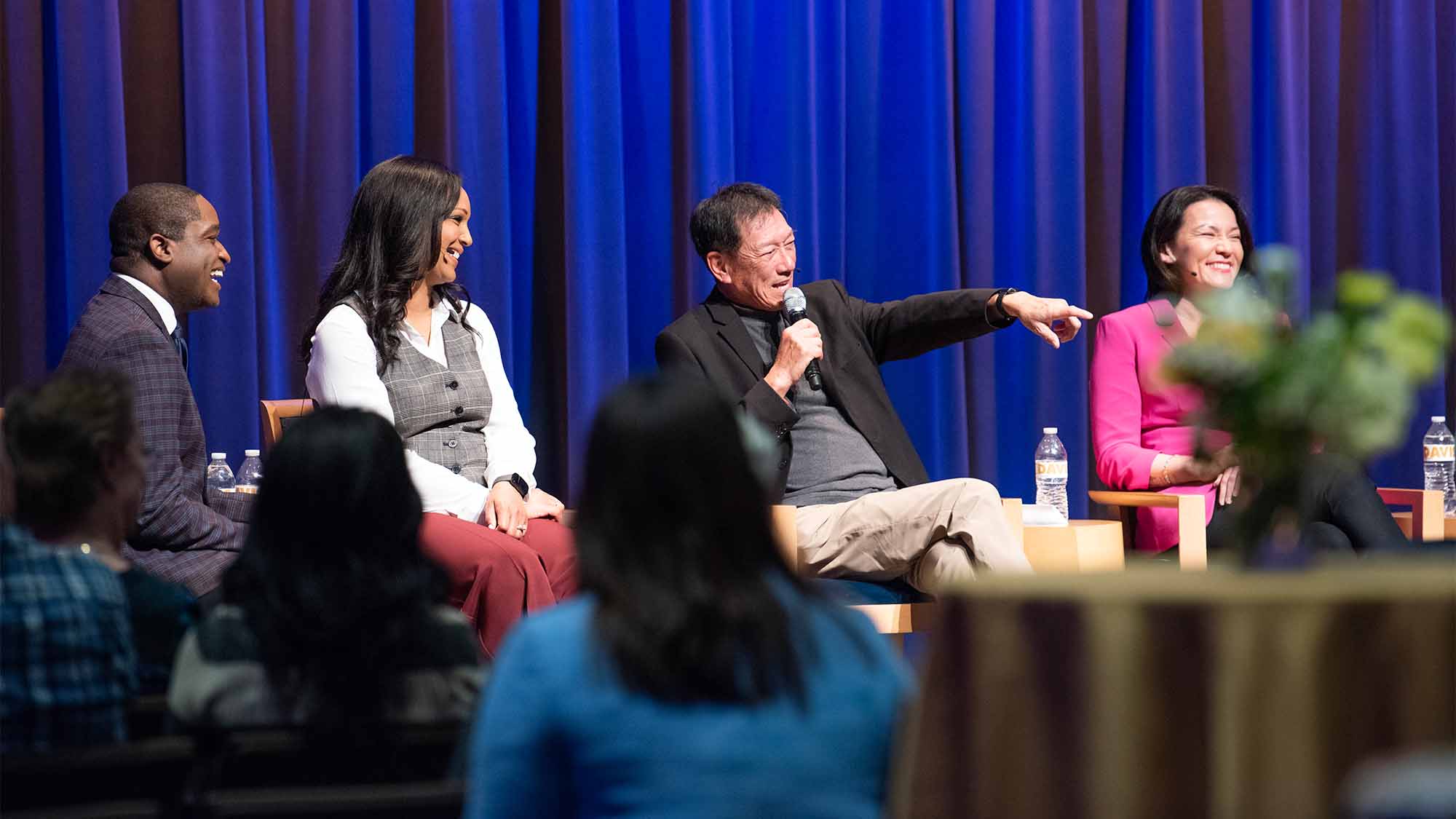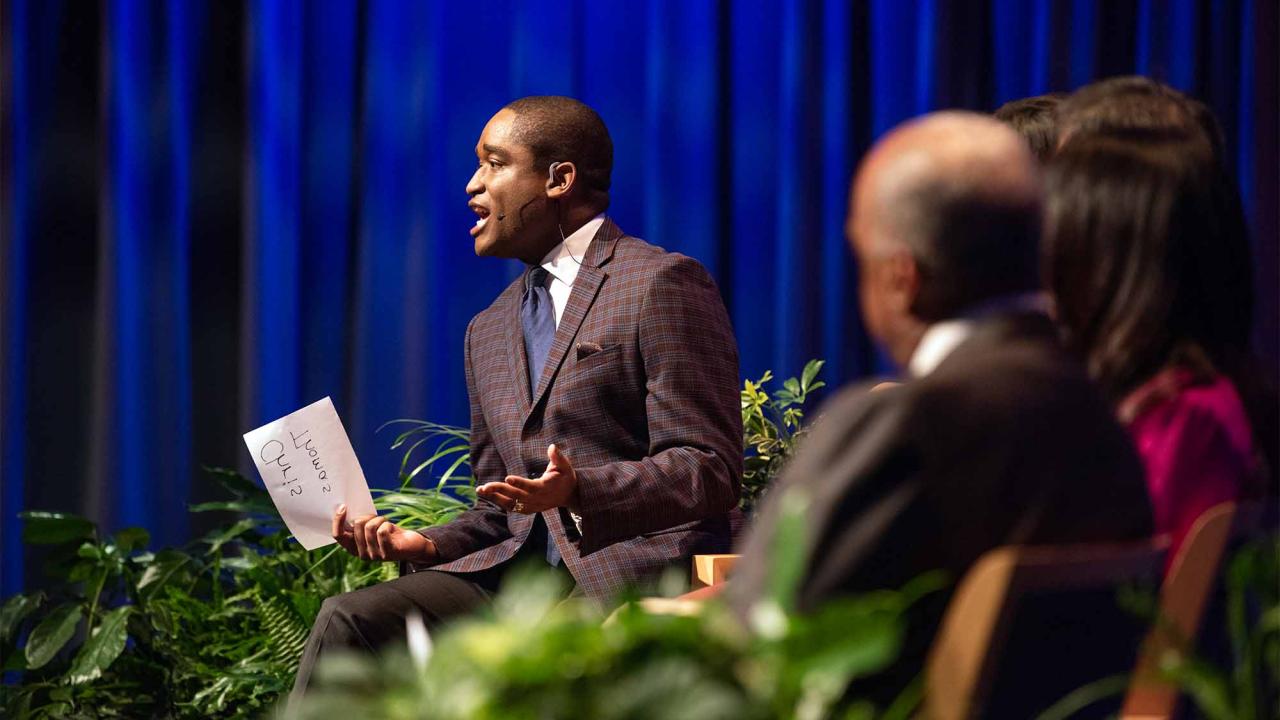Despite challenges in the industry, journalists can still speak truth to power and challenge the status quo around underrepresented populations, four members of the news media said last week at Chancellor Gary S. May’s winter colloquium.
Chris Thomas, an evening anchor at Sacramento’s ABC10, said it was “a big deal” that someone like him, who grew up in Birmingham, Alabama, listening to his mother’s stories of drinking from segregated water fountains, could be the top anchor at a news station in California’s capital city.
“That shows that we have come a long way,” Thomas said. “The challenge is, what do you do when you have an opportunity to have a seat at the table?”
He was one of the broadcast journalists speaking at the Chancellor’s Colloquium Distinguished Speaker Series event, “Diverse Voices in the Media: Amplifying Inclusivity and Representation,” held March 6 at the Mondavi Center.
Challenges, opportunities
Thomas recalled newsroom debates over issues like whether to show police body camera footage of the death of Sacramento-native Tyre Nichols at the hand of Memphis, Tennessee, police.
“If I ever get beat down like that, show the footage,” he recalled telling colleagues. “I think that's why it's so important for us to have a diverse newsroom, because you get a plethora of experiences and perspectives that help inform the decisions that you make.”
He also recalled times when he challenged the status quo, like when a KKK official in Virginia told Thomas their organization was meant to be a Bible study group, and Thomas was able to point out the fact that the KKK had bombed a number of churches in his home town.
The journalists on last week’s panel also discussed internal pressures.
Brandi Cummings, an anchor with KCRA 3 News, said the work of Black and brown journalists can be “overly scrutinized” and more heavily edited.
“In newsrooms, Black journalists are dealing with and challenged with ideas of whether or not you're able to bring your authentic voice to the conversation,” she said. “Whether or not we feel valued as a part of the team, or if we are just existing as a number, being someone else checking off a box.”
Lonnie Wong, a retired journalist with Fox40 News, recalled overt efforts in past decades to hire journalists from underrepresented backgrounds, which resulted in at least one Sacramento journalist changing his surname to one that sounded more exotic — and getting job offers as a result. But, Wong stressed, cultural competence — not just heritage — should always be taken into account.
“So you have an Asian face, a Black face, a Hispanic face on TV that supposedly represents the community,” Wong said, noting that he has met journalists from underrepresented populations whose sole goal is to get on TV or earn money, not increase diverse coverage. “But again, what do you do? What do you do when you get a seat at the table?”
Vicki Gonzalez, the host of Capital Public Radio’s Insight, said growing up with family members who were immigrants from different countries emphasized for her the importance of everyone’s unique lived experiences.
“I think that’s why I became a journalist,” she said.

A struggling business
They discussed challenges that face the journalism industry, including pressure from social media and artificial intelligence. More than 500 members of the news media were laid off in January alone, according to a report from an outplacement firm.
Gonzalez said Capital Public Radio has lost some of its younger, more diverse staff members hired in recent years, both as a result of layoffs and voluntary departures during the station’s financial struggles.
Wong said as a familiar face on local TV, he was often recognized on the street. Now he’s only recognized by those older than 35, he said.
Chancellor May said his daughters don’t have a way to even watch broadcast news at home.
But when asked what they would say to UC Davis students considering careers in journalism, they provided encouragement.
“Despite all the challenges, it’s been fulfilling,” Gonzalez said, noting that while her station’s recent issues have been painful, she still supports its mission and continues to donate money to the station.
Cummings said students shouldn’t let others stop the pursuit of their goals.
“Don't necessarily feel like you have to follow this traditional path,” she said. “And if there isn't one, make one.”
Bonding with the community
Attendees at last week’s colloquium connected with what the speakers had to say.
John Montoya, a Woodland resident, attended with his sister — a recent UC Davis retiree — because “we watch Chris on the news Monday through Friday.”
“We came to get their perspective,” Montoya said of the speakers. “It was very informative.”
Two students in attendance who work at KDVS connected with what Wong said about his time at the campus radio station, when he said students would bend rules to help it operate more effectively.
“There are a lot of people in the KDVS community who just take care of issues themselves,” said Jacob Ikuma, the station’s general manager and a senior double majoring in sociology-organizational studies and cinema and digital media. “We’re still doing what they were doing then.”
Editor’s note: This story was updated March 14 to clarify language around staff departures from Capital Public Radio.
Media Resources
Cody Kitaura is the editor of Dateline UC Davis and can be reached by email or at 530-752-1932.
